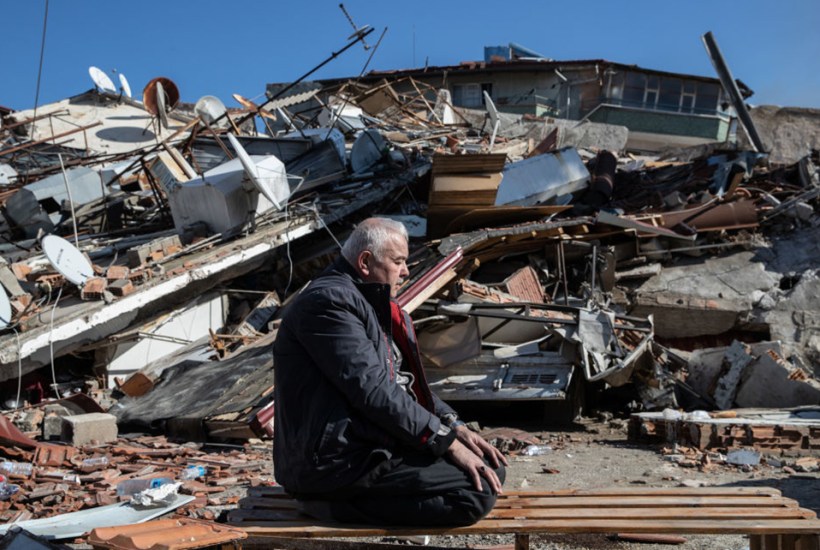This week’s earthquake in Turkey and northern Syria is a reminder that in spite of civilisation’s advance and human ingenuity, there are natural disasters we can do little to prevent or to protect ourselves from.
Though the death toll from floods, drought and storms has fallen dramatically over the past century, the toll from tsunamis, earthquakes and volcanos has remained the same. We have little defence against shifting tectonic plates.
After an earthquake, what matters is the speed at which aid arrives. Every minute counts in the effort to find people buried under the debris, to distribute food and to rebuild infrastructure. A country’s aid programme, therefore, should be judged not by the amount of money it’s prepared to spend, but by how well it works. In this case, the disaster in Turkey provides an opportunity for the UK government to answer the critics of its international aid policy and demonstrate its efficiency.
As chancellor, Rishi Sunak came in for much criticism for reducing Britain’s aid target from 0.7 to 0.5 per cent of gross national income (GNI). That 0.7 target had been enshrined in law by David Cameron in 2015. But the spending of money is not an achievement in itself. The requirement to spend and the doling out of cash without accountability can in the end do more harm than good. The Department for International Development resorted to simply handing cash to the World Bank. This did not inspire confidence.
What matters is not the quantity of UK aid but its quality. It will surprise many to learn that only £743 million of the £11 billion spent by the UK on aid in 2021 was in the form of direct humanitarian assistance: emergency response to floods, earthquakes and other disasters. A further £970 million was spent on health programmes and just over £1 billion on refugees, but the bulk of the money was spent on long-term development aid and contributions to global bodies such as the United Nations.
While much long-term aid spending has no doubt performed some useful purpose, it is of more questionable value than emergency aid. As we have seen in many countries such as Haiti, endless poorly conceived aid projects can perpetuate rather than tackle poverty. Some aid projects – especially those concerned with climate change or gender issues – are designed to suit the political fashions of western governments rather than the needs of third-world recipients.
If you shower a country with clothes which have been discarded by western consumers, for instance, or subsidise exports of surplus rice from rich countries, you undermine local industries and agriculture. And as economists often point out, aid money can create corruption, fuel inflation, undermine the market and stifle innovation. In Africa, aid increases often go alongside decreases in growth. Then look at China. Millions have been allocated to promoting ‘inclusive growth’ there and tens of thousands spent on helping it come up with ‘climate risk assessment’ – in a country building coal-fired power stations.
Where emergency aid is concerned, however, politics should not play a part. Within 24 hours of the earthquake, the Foreign Office announced that it had sent 76 search and rescue specialists, with dogs, to help in the effort of finding survivors. That is a good start. There is only a brief window to save lives. Hopefully, we will be as swift in deploying the help needed to rebuild lives over the coming months. But in the longer term, we should be asking what more we can do to enable rapid deployment of emergency teams of specialists. The government should be reviewing development aid and asking whether more resources might be transferred to humanitarian aid.
But this requires a more flexible approach to aid spending. Natural disasters do not occur at regular intervals, as might be preferred by government accountants. In some years the world will escape with mercifully few; in another year a spate of earthquakes might affect densely populated areas in poor countries with poor infrastructure. Would it really be such a bad thing if one year we spent only 0.4 per cent of GNI but were able to expand that to 0.8 per cent the following year if the situation demanded it?
We need to be careful, too, to target aid money on real problems rather than on worthy but less well-conceived policy objectives. The proper response to events such as the floods which devastated Pakistan last summer is not to fly out solar-panel sales people to developing countries in the hope that this will cut global carbon emissions and reduce future flooding events – not least because the links between climate change and extreme weather events are often tenuous and contested. It is to rush out inflatable boats, search and rescue experts and specialists in emergency supplies of power and drinking water.
For too long, governments have doled out aid money in a patrician fashion, hoping that Britain might receive a pat on the back in return. Some people see aid as an instrument of soft power, calculating that it might bring some benefits to Britain in a round-about way.
A better justification for aid is one of pure humanity: saving and rebuilding lives in times of natural disaster. That, and not the pursuit of an arbitrary spending target, should be the focus of UK aid.
Got something to add? Join the discussion and comment below.
Get 10 issues for just $10
Subscribe to The Spectator Australia today for the next 10 magazine issues, plus full online access, for just $10.
You might disagree with half of it, but you’ll enjoy reading all of it. Try your first month for free, then just $2 a week for the remainder of your first year.














Comments
Don't miss out
Join the conversation with other Spectator Australia readers. Subscribe to leave a comment.
SUBSCRIBEAlready a subscriber? Log in